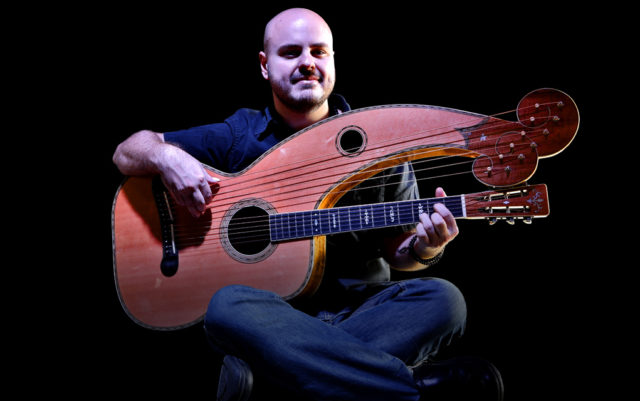
We don’t know, and wouldn’t ask, if Andy McKee was a church-going kind of guy. But preparing for our interview, we came across a YouTube video of the esteemed Doyle Dykes at a music convention a few years ago. Dykes, a lifelong devout Christian and one of the acoustic guitar’s most prolific and astonishing players, was doing a between-song gab with his audience and he asked, “What’s God’s favorite chord?”
Gsus.
We tell it to McKee; it takes him a second or two, but he gets it and laughs. Then laughs some more.
“I like that one,” he says, and laughs some more.
Icebreaker out of the way, we can’t help but note that the arc of Andy McKee’s career, and the substance of his playing, eerily mirrors that of Boulder’s own “Acoustic Ninja,” Trace Bundy. Both Midwesterners, both cut their teeth playing coffeehouse gigs to small and relatively sympathetic audiences, both finding their way into highly percussive, exotically tuned acoustic explorations, and both surfed an early and stiff downstream draft from heavily viewed YouTube videos.
McKee and Bundy have been friends for years (they last shared the stage locally for Bundy’s holiday special at the Boulder Theater in December), but when we catch up with McKee, he recalls the faintly frustrating first time he encountered Bundy.
“I’d gone out to play a show in Denver. I’d brought a friend of mine from New Jersey to play the show with me, and the venue had booked an opening guy, and it was Trace. I didn’t know who he was or anything, but we go in and the place was packed, totally loaded during his show. And he finished his set, and the place totally emptied. Like, there were three guys left,” he says.
“We were like, ‘Hey, what are we? Chopped liver?’”
Of course, there’s no such thing in the world of solo acoustic guitar as playing in, or struggling to escape from, anyone else’s shadow. Like the solo performer in any genre, it is a solitary enterprise; a one-to-one relationship with the audience, no band or orchestra from which to bank shot or bury oneself in, and as is commonly the case, especially for acoustic guitarists, the player and his arrangements are completely locked into a single identity. The originals are unique and a deeply personal expression of the artist’s strengths, and the covers (and they all play them, as a matter of practicality as well as tribute) reflect compositional and technical inclinations as distinctive as fingerprints.
For McKee — whose dazzling technique includes percussive accompaniment on the guitar body, dizzying single note flourishes and deftly fluid chordal melodies — the early days were primarily electric guitar, figuring out Eric Johnson and Joe Satriani runs, until a relative dragged him to a clinic by one of the “new acoustic” masters.
“It was Preston Reed. It was actually my 16th birthday. I saw him play, and was totally mesmerized and fascinated by what he was doing with the acoustic guitar,” McKee says. “I had thought the acoustic guitar was sort of a boring instrument, especially the steel string. I had a nylon string and learned a couple of classical things, and that was cool, but I always thought the steel string was… y’know, for strumming around a campfire.”
Like Neil Young? (Sorry, Neil)
“Yeah, right? I just didn’t have any interest in it. But when I saw [Reed], I couldn’t believe you could cover so many different aspects of music on one guitar. I’d never heard the percussion stuff taken to that level, accompaniment parts on your left hand while doing melodic stuff with your right hand, so he was the first guy who made me want to check it out. I learned a couple of his tunes. But then I discovered Michael Hedges.”
Hedges, of course, is the guitarist who is widely credited with fostering and perfecting this percussion-intensive, genre-defying subgenre of acoustic playing, setting the blueprint for an entire generation of players scaring up new sonic extensions of the ancient instrument. Hedges died in a single car accident in 1997, a few weeks before his 44th birthday. Many guitarists, including McKee, Reed, the French-Algerian guitarist Pierre Bensusan (one of Hedges’ early influences) and Leo Kottke have paid tribute to Hedges.
“It wasn’t just really the way he played or the techniques he was using, it was the music itself that I was just moved by,” McKee says. “He was such a powerful composer; the music was really profound for one guitar to do what he was doing. So he became my biggest influence, I think.”
McKee comes to Copper Mountain as part of the Guitar Town festival, a collection of some the biggest names in fretboard bedazzlement. Coco Montoya, Robben Ford, Preston Reed, John Jorgenson, and heading up the Saturday acoustic lineup, Al Di Meola.
Even for McKee, comfortably seated among the best acoustic players anywhere, this gig promises a little bit of a challenge.
“There’s an improvised jam thing that everybody does together. That part actually makes me a bit nervous, more than anything else, because I don’t feel like I’m a really great improviser. There are so many great guitar players.”
Like Di Meola?
“Yeah, no kidding,” he says with a laugh. “There ya go. I just wanna take cover, man. Al Di Meola. Legend.”
On the Bill: Guitar Town at Copper Mountain. Friday, Aug. 10–Sunday, Aug. 12, Copper Mountain Resort, 509 Copper Road, Frisco. copperguitartown.com














